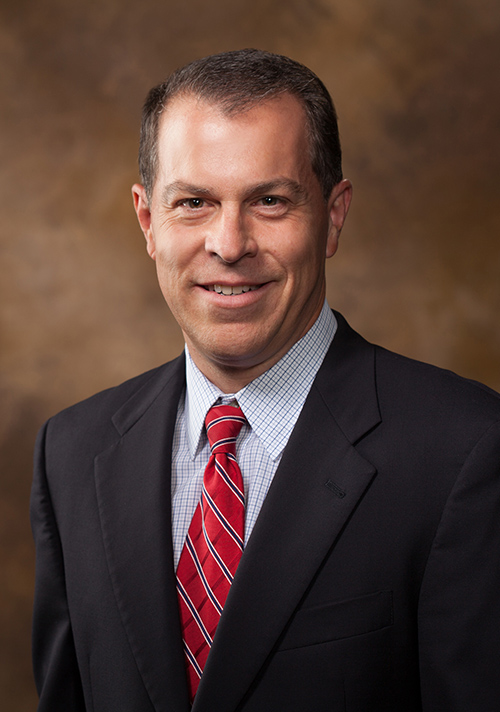U of A Professor's Article Examines Issues of Athletic Departments Acting as Media
Earlier this summer, the North Dakota State athletic department attempted to charge media organizations for broadcast rights to cover the school's football team. The move was quickly reversed by school officials after a critical reaction, but the issues surrounding traditional media access to college athletic programs will not be going away anytime soon.
Many college athletic departments now create and distribute their own content and strictly regulate media access to information, players and programs. What legal issues are raised when college athletic departments function as media organizations in these ways?
University of Arkansas professor Steve Dittmore examined that question in an article published this month in the Marquette Sports Law Review.
The law review editors organized a virtual symposium on the changing landscape and future of college athletics and invited Dittmore, an associate professor of recreation and sport management, to write an article for a special issue.
The article, titled "College Athletic Departments as Media Organizations and the Regulation of Content: Issues for the Digital Age," is available on the publication's website.
Dittmore, the co-author of a textbook on public relations in sports, wrote a similar piece in 2014 for the National Association of Collegiate Directors of Athletics in which he discussed the changing role of athletic departments in the digital age of social media in which anyone with a cell phone can be a journalist of sorts.
In the new article, Dittmore looked at three main areas: the evolving definition of who, or what, constitutes media; whether an athletic department can limit access to traditional media while simultaneously disseminating restricted content on its platforms; and the types of content restrictions imposed by athletic departments.
Dittmore makes a distinction between the activity of journalism and the professional function of journalism.
"I can stream live anything with the phone in my pocket, from a football game in Dallas, to an uprising in Egypt," he said. "I'm performing the activity of journalism, but I may not have had professional training in the function of journalism."
He describes court decisions implying that individuals or organizations that engage in blogging may be considered journalists under certain circumstances.
Additionally, courts have asserted that athletic associations at the high school and collegiate levels are state actors and must consider due process when creating policies, procedures and rules, Dittmore said. He described a 2011 Wisconsin Interscholastic Athletic Association v. Gannett Co. lawsuit in which an appeals court upheld a ruling, however, that state actors such as the association have the same right as private entities to enforce their property rights to games. It's not clear whether that principle also applies to non-game information or practice, Dittmore said.
Decreased access to some types of information may turn some fans off, he said.
"Today's consumer wants to engage with a product at a time when it is convenient for the consumer and on a platform that is convenient for the consumer," he said.
Fans may have access to more content and information than they did five years ago, Dittmore said, but it's up to the fans to differentiate between types of content. They may be getting only one side of issues from the athletic department. That's because reduced access to college athletic departments for mainstream media means less objectivity in sports coverage.
"One way that traditional media are striving to maintain audiences is by providing analysis," Dittmore said. "Fans want opinions and analysis whether on talk radio, on ESPN with a talking head show or through social media. It's something more than just 'the team didn't get the first down.' Historically, the traditional media have focused on objectivity."
Dittmore recommends that athletic departments use new media platforms and technologies that place them on similar footing as traditional media outlets to engage consumers, rather than shutting out the media or their fan bases.
Contacts
Heidi S. Wells, director of communications
College of Education and Health Professions
479-575-3138,
heidisw@uark.edu
Headlines
Four Students Named Goldwater Scholars; Two Earn Udall Honorable Mentions
Four U of A students have received the prestigious Goldwater Scholarship, an award for top students in mathematics, science, and engineering.
Cross-Campus Collaboration Culminates in New Outdoor Geological Installation
Grand opening event to celebrate the new GeoLab installation at the U of A’s Gearhart Hall courtyard is set for May 3. The installation will be open to the public year-round.
First Students to Use Online Degree to Hone Nursing Leadership, Elevate Patient Care
Hanna Baxendale and Wendi Kimbrell will begin coursework in the Doctor of Nursing Practice-Executive Master of Business Administration program offered by the Eleanor Mann School of Nursing and Walton College.
Join the Office for Sustainability on a Final Cruise to Campus
Cruise to Campus Wednesdays have fostered a gathering space for individuals interested in biking to campus. Drop by the Old Main Lawn from 7:30-10 a.m. Wednesday for coffee, something to eat and conversation.
Fay Jones School Student Ambassador Program Gives Voice to Design Students
The student ambassador program at the Fay Jones School of Architecture and Design is built to connect top design students with their school, its alumni, its future students and others inside and outside the school.





